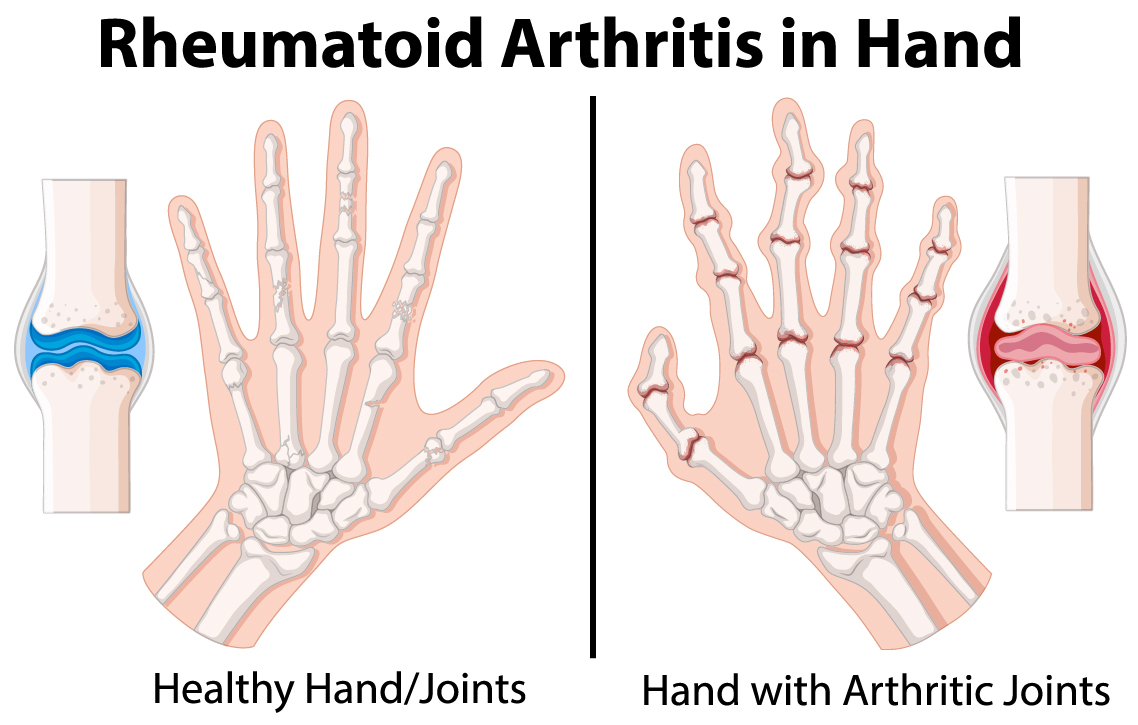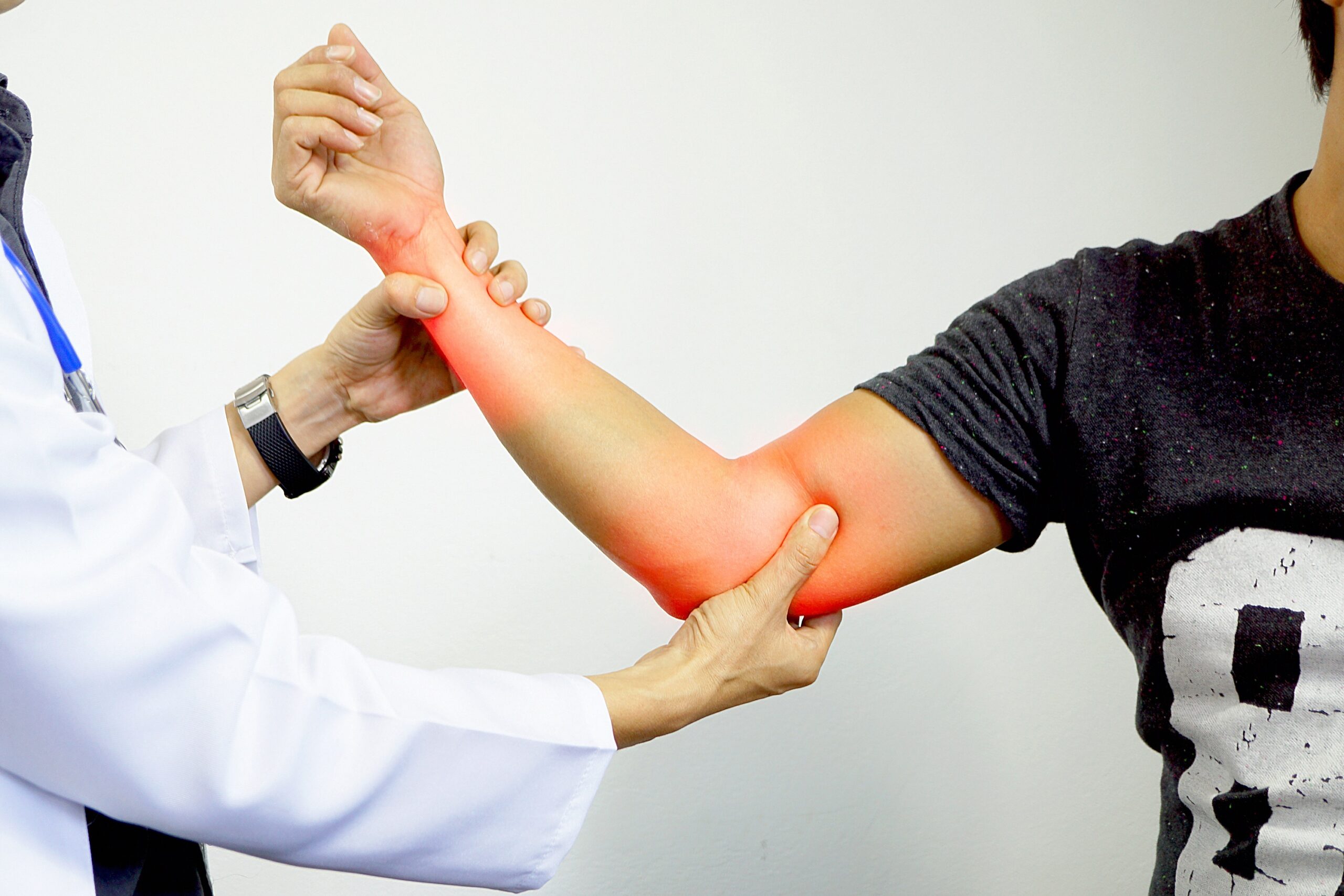Does Rheumatoid Arthritis Lead to Disability?
Rheumatoid arthritis is getting a lot of attention lately, but it is important to understand that having this condition does not automatically mean becoming disabled. This article aims to provide helpful information about rheumatoid arthritis, empowering those dealing with it to manage effectively and enhance their quality of life.
Dr. Naravadee Kositpesat, our rheumatologist at Bangkok Hospital Hua Hin shares that rheumatoid arthritis is a chronic inflammatory joint disease that cannot be cured and often leads to severe pain and suffering. Without proper treatment, it can cause disability, complications, and premature death.
 The exact cause of rheumatoid arthritis is not fully known yet. However, studies have found that this disease has genetic risk factors and environmental risk factors. These include exposure to silica dust, smoking, gum disease, certain viral infections. It does not just affect joint; it can also impact other parts such as the eyes, muscles, inflamed blood vessels, lung fibrosis, inflamed lung or heart membranes, leading to chronic inflammation and anemia. Rheumatoid arthritis can affect people of all ages from children to the elderly, but it is often seen in middle-aged individuals and is more prevalent in females than males.
The symptoms of rheumatoid arthritis typically start with joint pain, starting in a few joints before spreading to multiple joints symmetrically. This pain can affect small joints like fingers, toes or larger ones like such as wrists, elbows, and knees. Patients may experience stiffness, swelling, and have trouble using the joints normally. Symptoms are often worse in the morning and may include severe pain lasting over an hour. Without treatment, symptoms can worsen, lasting more than 3-4 hours, but might improve later in the day. It is important not to ignore these symptoms and to seek medical advice for the proper diagnosis and treatment. Delayed or wrong treatment can lead to joint damage, deformities, and disability.
The exact cause of rheumatoid arthritis is not fully known yet. However, studies have found that this disease has genetic risk factors and environmental risk factors. These include exposure to silica dust, smoking, gum disease, certain viral infections. It does not just affect joint; it can also impact other parts such as the eyes, muscles, inflamed blood vessels, lung fibrosis, inflamed lung or heart membranes, leading to chronic inflammation and anemia. Rheumatoid arthritis can affect people of all ages from children to the elderly, but it is often seen in middle-aged individuals and is more prevalent in females than males.
The symptoms of rheumatoid arthritis typically start with joint pain, starting in a few joints before spreading to multiple joints symmetrically. This pain can affect small joints like fingers, toes or larger ones like such as wrists, elbows, and knees. Patients may experience stiffness, swelling, and have trouble using the joints normally. Symptoms are often worse in the morning and may include severe pain lasting over an hour. Without treatment, symptoms can worsen, lasting more than 3-4 hours, but might improve later in the day. It is important not to ignore these symptoms and to seek medical advice for the proper diagnosis and treatment. Delayed or wrong treatment can lead to joint damage, deformities, and disability.
 Diagnosing rheumatoid arthritis in the early stages often progresses slowly, requiring a specialist physician to make the diagnosis. Physicians typically diagnose based on key symptoms, physical examinations, and laboratory tests combined, to recommend appropriate care for each patient.
The treatment of rheumatoid arthritis depends on the severity of the disease, starting with self-care, rest, and lifestyle adjustments, such as quitting smoking, maintaining a healthy weight, and eating well, consuming foods rich in calcium and vitamin D. Taking care and preventing joints from being damaged further involves avoiding activities that stress the joints, such as heavy lifting or sitting in certain positions, can also help. Warm compresses ease pain, and medications prescribed by a doctor can manage and treat rheumatoid arthritis effectively.
“The diagnosis of rheumatoid arthritis does not mean you are disabled. This is a condition we can manage effectively with appropriate methods. The key is receiving proper treatment from a specialized doctor, which can significantly improve your quality of life and prevent disability issues.” Dr. Naravadee concluded.
Diagnosing rheumatoid arthritis in the early stages often progresses slowly, requiring a specialist physician to make the diagnosis. Physicians typically diagnose based on key symptoms, physical examinations, and laboratory tests combined, to recommend appropriate care for each patient.
The treatment of rheumatoid arthritis depends on the severity of the disease, starting with self-care, rest, and lifestyle adjustments, such as quitting smoking, maintaining a healthy weight, and eating well, consuming foods rich in calcium and vitamin D. Taking care and preventing joints from being damaged further involves avoiding activities that stress the joints, such as heavy lifting or sitting in certain positions, can also help. Warm compresses ease pain, and medications prescribed by a doctor can manage and treat rheumatoid arthritis effectively.
“The diagnosis of rheumatoid arthritis does not mean you are disabled. This is a condition we can manage effectively with appropriate methods. The key is receiving proper treatment from a specialized doctor, which can significantly improve your quality of life and prevent disability issues.” Dr. Naravadee concluded.
 **************************************************************************
For more information and booking an appointment, please contact :
Tel. 032-616-800 Call Center, Bangkok Hospital Hua Hin
Tel: 032-616-880 (7.00 – 19.00 hrs.) Out-Patient Department, ground floor
News & Information >> Line ID : @bangkokhuahin
**************************************************************************
For more information and booking an appointment, please contact :
Tel. 032-616-800 Call Center, Bangkok Hospital Hua Hin
Tel: 032-616-880 (7.00 – 19.00 hrs.) Out-Patient Department, ground floor
News & Information >> Line ID : @bangkokhuahin
 The exact cause of rheumatoid arthritis is not fully known yet. However, studies have found that this disease has genetic risk factors and environmental risk factors. These include exposure to silica dust, smoking, gum disease, certain viral infections. It does not just affect joint; it can also impact other parts such as the eyes, muscles, inflamed blood vessels, lung fibrosis, inflamed lung or heart membranes, leading to chronic inflammation and anemia. Rheumatoid arthritis can affect people of all ages from children to the elderly, but it is often seen in middle-aged individuals and is more prevalent in females than males.
The symptoms of rheumatoid arthritis typically start with joint pain, starting in a few joints before spreading to multiple joints symmetrically. This pain can affect small joints like fingers, toes or larger ones like such as wrists, elbows, and knees. Patients may experience stiffness, swelling, and have trouble using the joints normally. Symptoms are often worse in the morning and may include severe pain lasting over an hour. Without treatment, symptoms can worsen, lasting more than 3-4 hours, but might improve later in the day. It is important not to ignore these symptoms and to seek medical advice for the proper diagnosis and treatment. Delayed or wrong treatment can lead to joint damage, deformities, and disability.
The exact cause of rheumatoid arthritis is not fully known yet. However, studies have found that this disease has genetic risk factors and environmental risk factors. These include exposure to silica dust, smoking, gum disease, certain viral infections. It does not just affect joint; it can also impact other parts such as the eyes, muscles, inflamed blood vessels, lung fibrosis, inflamed lung or heart membranes, leading to chronic inflammation and anemia. Rheumatoid arthritis can affect people of all ages from children to the elderly, but it is often seen in middle-aged individuals and is more prevalent in females than males.
The symptoms of rheumatoid arthritis typically start with joint pain, starting in a few joints before spreading to multiple joints symmetrically. This pain can affect small joints like fingers, toes or larger ones like such as wrists, elbows, and knees. Patients may experience stiffness, swelling, and have trouble using the joints normally. Symptoms are often worse in the morning and may include severe pain lasting over an hour. Without treatment, symptoms can worsen, lasting more than 3-4 hours, but might improve later in the day. It is important not to ignore these symptoms and to seek medical advice for the proper diagnosis and treatment. Delayed or wrong treatment can lead to joint damage, deformities, and disability.
 Diagnosing rheumatoid arthritis in the early stages often progresses slowly, requiring a specialist physician to make the diagnosis. Physicians typically diagnose based on key symptoms, physical examinations, and laboratory tests combined, to recommend appropriate care for each patient.
The treatment of rheumatoid arthritis depends on the severity of the disease, starting with self-care, rest, and lifestyle adjustments, such as quitting smoking, maintaining a healthy weight, and eating well, consuming foods rich in calcium and vitamin D. Taking care and preventing joints from being damaged further involves avoiding activities that stress the joints, such as heavy lifting or sitting in certain positions, can also help. Warm compresses ease pain, and medications prescribed by a doctor can manage and treat rheumatoid arthritis effectively.
“The diagnosis of rheumatoid arthritis does not mean you are disabled. This is a condition we can manage effectively with appropriate methods. The key is receiving proper treatment from a specialized doctor, which can significantly improve your quality of life and prevent disability issues.” Dr. Naravadee concluded.
Diagnosing rheumatoid arthritis in the early stages often progresses slowly, requiring a specialist physician to make the diagnosis. Physicians typically diagnose based on key symptoms, physical examinations, and laboratory tests combined, to recommend appropriate care for each patient.
The treatment of rheumatoid arthritis depends on the severity of the disease, starting with self-care, rest, and lifestyle adjustments, such as quitting smoking, maintaining a healthy weight, and eating well, consuming foods rich in calcium and vitamin D. Taking care and preventing joints from being damaged further involves avoiding activities that stress the joints, such as heavy lifting or sitting in certain positions, can also help. Warm compresses ease pain, and medications prescribed by a doctor can manage and treat rheumatoid arthritis effectively.
“The diagnosis of rheumatoid arthritis does not mean you are disabled. This is a condition we can manage effectively with appropriate methods. The key is receiving proper treatment from a specialized doctor, which can significantly improve your quality of life and prevent disability issues.” Dr. Naravadee concluded.
 **************************************************************************
For more information and booking an appointment, please contact :
Tel. 032-616-800 Call Center, Bangkok Hospital Hua Hin
Tel: 032-616-880 (7.00 – 19.00 hrs.) Out-Patient Department, ground floor
News & Information >> Line ID : @bangkokhuahin
**************************************************************************
For more information and booking an appointment, please contact :
Tel. 032-616-800 Call Center, Bangkok Hospital Hua Hin
Tel: 032-616-880 (7.00 – 19.00 hrs.) Out-Patient Department, ground floor
News & Information >> Line ID : @bangkokhuahin